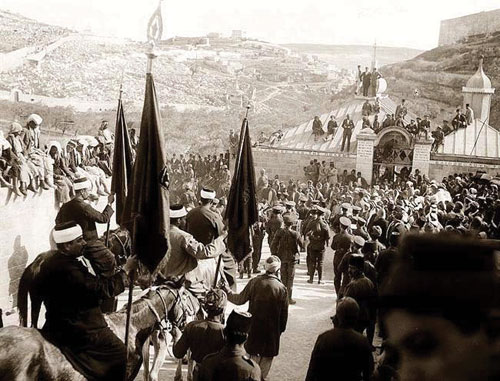.jpg)
The Haftorah (prophetic portion) read on Shabbat Nachamu, which follows Tisha B’Av, expresses the message of comfort conveyed by the prophet Isaiah to a bereaved nation soon to endure a prolonged exile for over two and-a-half millennia. Every year, the immortal words of Isaiah offer consolation and hope. In the city of Jerusalem in 1920, a reading of that Haftorah resounded throughout the Holy City and infused the people of Jerusalem with a renewed sense of hope.
Following the First World War, British military authorities in the Land of Israel, displayed hostility towards Zionism. During Passover 1920, pogroms were perpetrated by Arabs against the Jews of the Old City of Jerusalem. A few months later, with the transition of the British military occupation to a civil mandate, it appeared that British policy was reverting back to its stated course of recognizing Jewish Statehood as per the Balfour Declaration of November 2, 1917. British Prime Minister, Lloyd George, appointed a Jew, and professed Zionist, Sir Herbert Samuel, as the first British High Commissioner of British Mandated Palestine.
On July 1, 1920, Samuel disembarked from a British battleship at the port of Haifa as the new commissioner, or, as his biographer John Bowle put it, “the first Jewish ruler in Palestine since Hyrcanus the second” (whose reign ended 40 BCE). Samuel seemed to be the answer to the Zionists’ prayers. A Zionist leader, Arthur Ruppin commented in his diary on a ceremony held nine days later on the Mount of Olives in honor of Samuel’s appointment. “Until now, pronouncements about a Jewish National Home…had only been words on paper; but now they rose before us embodied in the person of a Jewish High Commissioner.…Many of the Jews present had tears in their eyes.”
On the morning of Shabbat Nachamu, July 31, 1920, Samuel, surrounded by an entourage of advisors and guards, set out on foot towards the famous Rabbi Yehudah HaChasid Synagogue in Jerusalem. He entered the Old City’s Jaffa Gate and headed toward the Jewish Quarter. Spectators gathered on the streets, which were adorned with flowers, to glimpse the man who represented their highest hopes and dreams. As he passed, the onlookers cheered and expressions of joy resonated. A sense of euphoria overcame the crowd.
Samuel entered the synagogue, which was filled to capacity, prepared to chant the Haftorah. Soon, he was summoned by the Gabbai with the words, “Ya’amod HaNasi Ha’Elyon” (May the High Commissioner arise). As Samuel stood up the entire congregation also rose to their feet. Samuel made his way to the front of the synagogue and proceeded to chant the words of the Haftorah, echoing the words of Isaiah, “Comfort, comfort my people, says God. Speak to her heart of Jerusalem and proclaim to her that her time [of exile] has been fulfilled, that her iniquity has been conciliated, for she has received for the Hand of God double for all her sins.”
The entire congregation quivered upon hearing the words that embodied their greatest hopes and dreams. It was a moment of intense emotion. An aid to Samuel described the scene as “a golden moment where the Jews in the synagogue felt as if the hour of redemption had arrived.”
Despite the euphoria, Samuel did not live up to the people’s expectations. Samuel yielded to pressure by Arabs and their British sympathizers. He imposed temporary restrictions on Jewish immigration to the Land of Israel. He also appointed Haj Amin Al Husseini— a vehement anti-Zionist responsible for inciting anti-Jewish riots, and later an ardent supporter of the Nazi regime and its genocidal plans against the Jews—to the position of Mufti (Muslim religious leader) of Jerusalem. A British policy of appeasement was set into motion. The restoration of the Land to the Jewish people would be a slow and arduous process filled with obstacles.
The course of events, however, did not change the impression of that Shabbat Nachamu. It was a special moment for the Jerusalemites who were present—one in which the age- old message of Jewish hope and redemption resonated.
By Larry Domnitch









